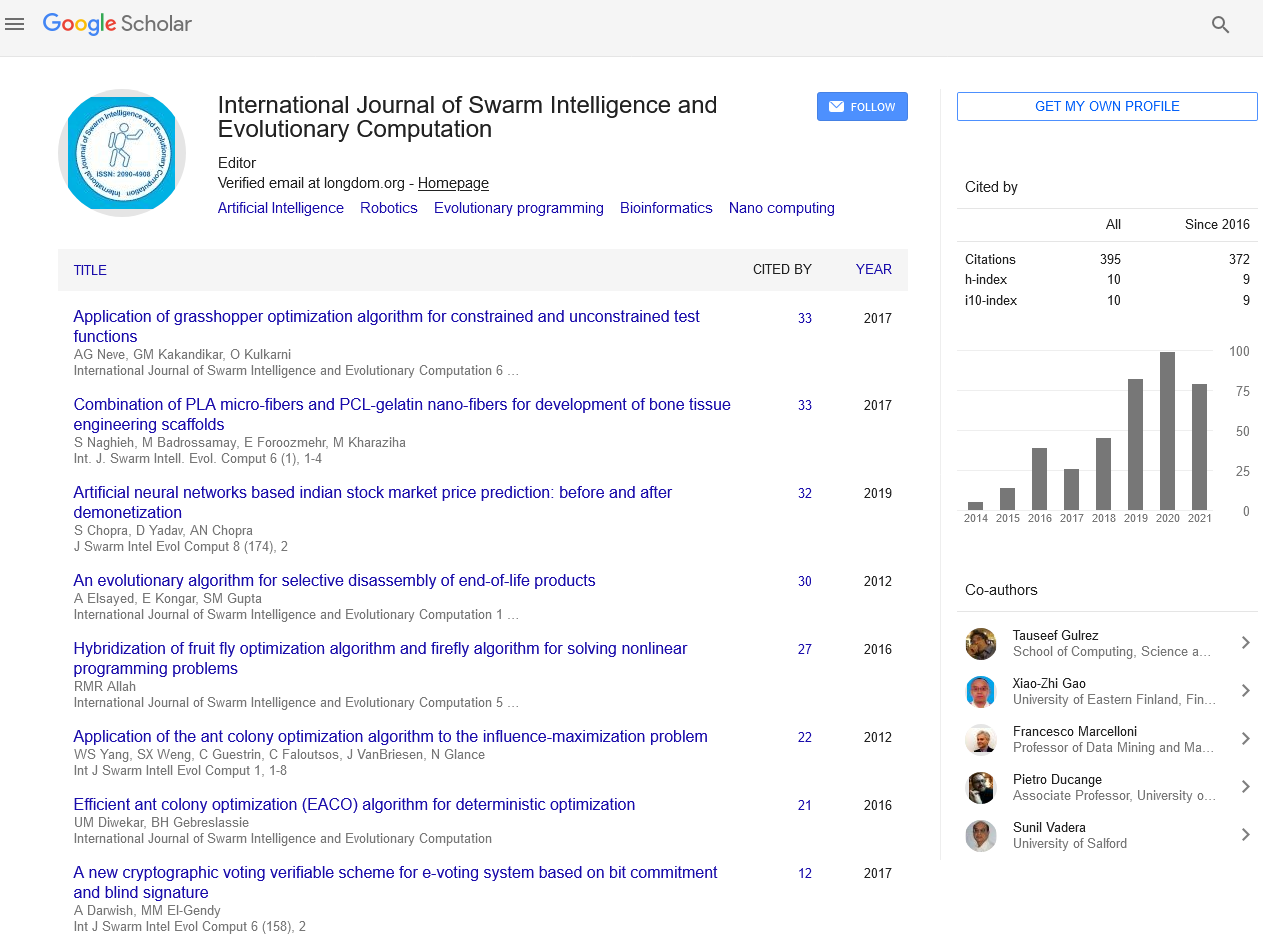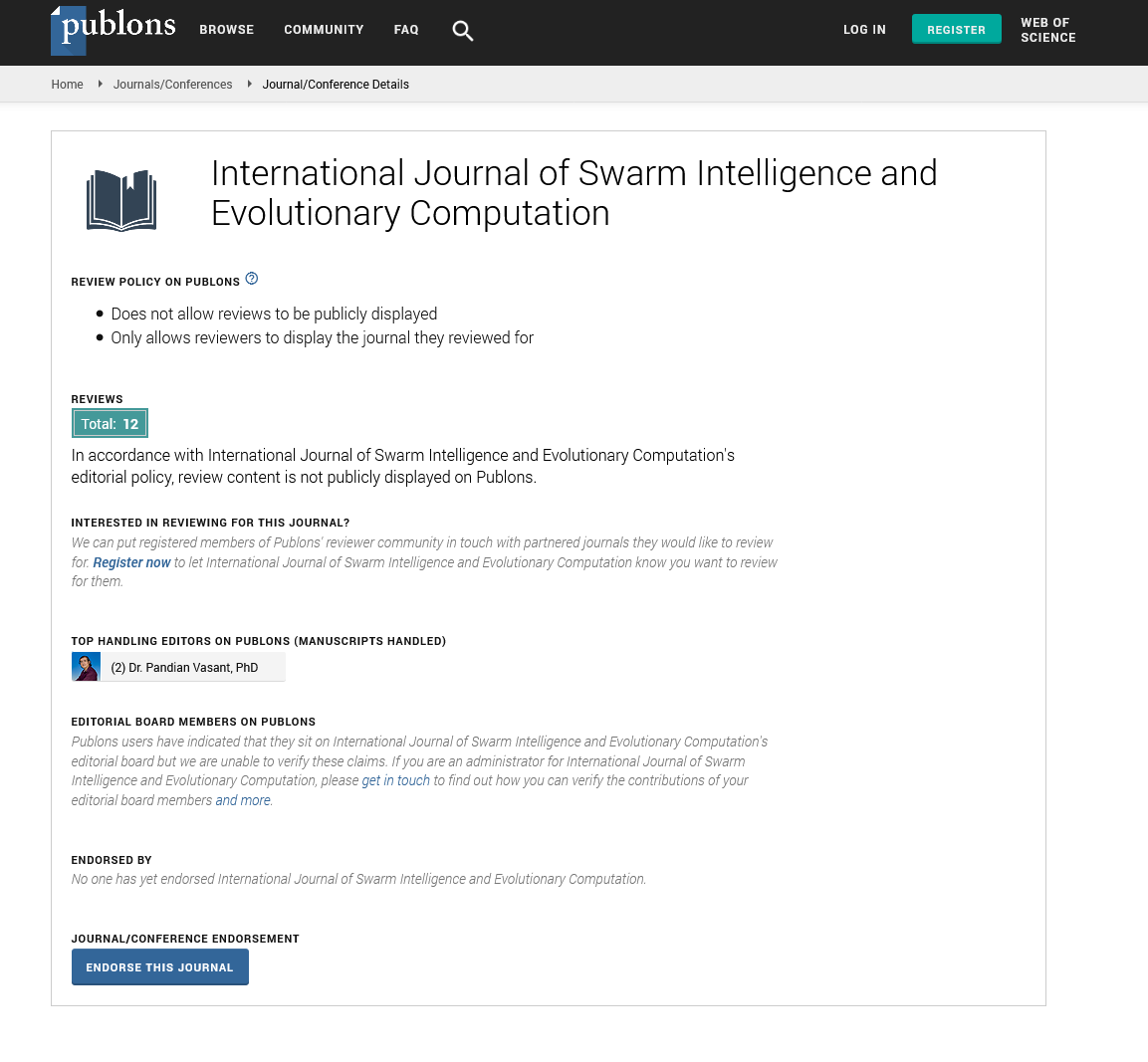Indexed In
- Genamics JournalSeek
- RefSeek
- Hamdard University
- EBSCO A-Z
- OCLC- WorldCat
- Publons
- Euro Pub
- Google Scholar
Useful Links
Share This Page
Journal Flyer

Open Access Journals
- Agri and Aquaculture
- Biochemistry
- Bioinformatics & Systems Biology
- Business & Management
- Chemistry
- Clinical Sciences
- Engineering
- Food & Nutrition
- General Science
- Genetics & Molecular Biology
- Immunology & Microbiology
- Medical Sciences
- Neuroscience & Psychology
- Nursing & Health Care
- Pharmaceutical Sciences
Commentary - (2023) Volume 12, Issue 1
Machine Learning: An Introduction to Modern Artificial Intelligence
Cheng Jeuin*Received: 02-Jan-2023, Manuscript No. SIEC-23-20390; Editor assigned: 04-Jan-2023, Pre QC No. SIEC-23-20390 (PQ); Reviewed: 18-Jan-2023, QC No. SIEC-23-20390; Revised: 26-Jan-2023, Manuscript No. SIEC-23-20390 (R); Published: 03-Feb-2023, DOI: 10.35248/2090-4908.23.12.297
Description
An area of Artificial Intelligence (AI) that is quickly expanding is machine learning, which focuses on producing models and algorithms that let computers learn from experience without having to be explicitly programmed. Artificial intelligence has come a long way since the first programmable computer was invented in the mid-twentieth century [1-3]. Today, it was witnessing a new era of artificial Intelligence where machines can learn from experience and improve their performance through data analysis. This field is known as machine learning, and it has become one of the most exciting and rapidly growing areas of research in computer science.
The roots of machine learning can be traced back to the 1940s, when the first computers were developed. The earliest machine learning algorithms were based on simple linear regression and statistical modeling techniques, and were used to solve problems in fields such as finance, engineering, and physics. Researchers started to produce more complex machine learning algorithms, such as neural networks and decision trees, in the 1950s. These algorithms were used to solve a wider range of problems, such as pattern recognition and speech recognition. Supervised learning, unsupervised learning, and reinforcement learning are the three primary types of machine learning. In contrast to unsupervised learning, which uses unlabeled data, supervised learning involves training a model using labeled data [4-6]. Using reinforcement learning, a model is taught to make choices depending on input from its surroundings.
Applications of machine learning
Machine learning has a wide range of applications in various fields, including healthcare, finance, marketing, and transportation [7]. In healthcare, machine learning algorithms can be used to analyze medical records and predict disease outcomes. In finance, machine learning algorithms can be used to detect fraudulent transactions and make investment decisions. In marketing, machine learning algorithms can be used to analyse customer behavior and personalize advertising campaigns [8-10]. In transportation, machine learning algorithms can be used to optimize traffic flow and improve safety on the roads.
Challenges and ethical considerations
Despite the potential benefits of machine learning, there are also several challenges and ethical considerations associated with the field. One of the main challenges is the lack of interpretability of machine learning models, which makes it difficult to understand how they make decisions. This can lead to biases and errors that may have negative consequences for individuals and society as a whole. In addition, there are ethical considerations related to the use of machine learning in sensitive areas such as healthcare and criminal justice, where decisions made by algorithms can have a significant impact on people’s lives.
Conclusion
Data and algorithms are used in machine learning, a subfield of artificial intelligence and computer science, to mimic human learning and gradually improve its accuracy. Machine learning is a powerful tool that has the potential to revolutionize many aspects of our lives. So it's crucial to approach this technology with prudence and think about how using it can affect morality. By understanding the basics of machine learning and its potential impact, it can work towards developing responsible and beneficial applications of this technology.
References
- Vadakkepat P, Peng X, Quek BK, Lee TH. Evolution of fuzzy behaviors for multi-robotic system. Rob Auton Syst. 2007;55(2):146-161.
- Sarker IH. Machine learning: Algorithms, real-world applications and research directions. SN Comput Sci. 2021;2(3):1-21.
[Crossref] [Google Scholar] [Pubmed]
- Dorigo M, Birattari M, Brambilla M. Swarm robotics. Scholarpedia. 2014;9(1):1463.
- Campion M, Ranganathan P, Faruque S. UAV swarm communication and control architectures: a review. J Unmanned Veh Syst. 2018;7(2):93-106.
- Stirling T, Wischmann S, Floreano D. Energy-efficient indoor search by swarms of simulated flying robots without global information. Swarm Intell. 2010;4(2):117-143.
- Vadakkepat P, Peng X, Quek BK, Lee TH. Evolution of fuzzy behaviors for multi-robotic system. Rob Auton Syst. 2007;55(2):146-161.
- Sarker IH. Machine learning: Algorithms, real-world applications and research directions. SN Comput Sci. 2021;2(3):1-21.
[Crossref] [Google Scholar] [Pubmed]
- Dorigo M, Birattari M, Brambilla M. Swarm robotics. Scholarpedia. 2014;9(1):1463.
- Stirling T, Wischmann S, Floreano D. Energy-efficient indoor search by swarms of simulated flying robots without global information. Swarm Intell. 2010;4(2):117-143.
- Campion M, Ranganathan P, Faruque S. UAV swarm communication and control architectures: a review. J Unmanned Veh Syst. 2018;7(2):93-106.
Citation: Jeuin C (2023) Machine Learning: An Introduction to Modern Artificial Intelligence. Int J Swarm Evol Comput. 12:297.
Copyright: © 2023 Jeuin C. This is an open-access article distributed under the terms of the Creative Commons Attribution License, which permits unrestricted use, distribution, and reproduction in any medium, provided the original author and source are credited.


